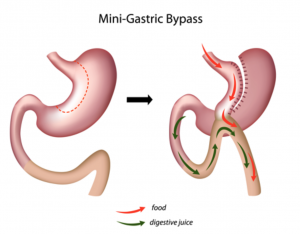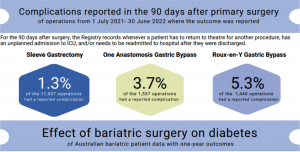
Need to reverse diabetes and drop weight in 2024? Struggling to fall pregnant due to obesity? Here’s three New Year’s resolutions to think about – and how the Mini Gastric Bypass can help you achieve your goals.
1. The Mini gastric Bypass can help reverse diabetes
Gastric Sleeve surgery (or Sleeve Gastrectomy) is the “go to surgery” for uncomplicated obesity and type 2 diabetes.
However, for patients with obesity who ALSO have severe or unstable diabetes, it’s the Roux-en-Y-Gastric Bypass that is the “gold standard” for longer-term diabetes remission.
“The 2022 Bariatric Surgery register shows that 70% of all insulin-dependent patients were off insulin within a year of surgery, irrespective of whether the surgery was sleeve, bypass or the Mini Gastric Bypass,” says Melbourne Bariatric and Laparoscopic Surgeon Mr Jason Winnett.
“However, for patients with more severe diabetes who are on multiple medications, the Mini Gastric Bypass is now also clinically proven to have better long-term diabetes remission without medication than the Sleeve.”
2. The risk profile of the Mini Gastric Bypass is “mini”
“As the Mini-Gastric Bypass procedure is a simpler procedure, it takes about 50 minutes less time on the table and so the anaesthetic risks and complications are lower than standard bypass surgery,” says Mr Winnett.
So, what’s the difference then? During standard Gastric Bypass, the stomach is made much smaller and shaped into an egg-sized pouch that holds about 150ml of food.
“The small intestine is then split into two pieces known as a double anastomosis (or two surgically made channels that connect organs).
“The surgeon attaches one anastomosis to the bottom of the new pouch. The second is rerouted lower down to the small intestine, bypassing most of the digestive system and small intestine,” says Mr Winnett.
“With the miniature procedure, (single anastomosis), the pouch still holds about 150ml of food, and the surgeon reroutes just one portion which is longer, even lower down the small intestine, bypassing 20% of the digestive system.”
Mr Winnett says that the Mini Gastric Bypass has a slightly higher complication rate than the Gastric Sleeve surgery, but less than the standard Gastric Bypass.

According to the bariatric surgical registry in Australia, the complication rate for bariatric surgeries in 2022 was about 5.3% for the Gastric Bypass compared to the Mini Gastric Bypass which is about 3.7%.
“The Gastric sleeve complication rate was about 1.3% which makes it the surgery of choice for about 80% of doctors and patients across the board where there are no major diabetes complications.”

Source: 2022 Bariatric Surgery Registry Annual Report Summary.
There are other benefits to the Mini Gastric Bypass procedure too, says Mr Winnett.
“Revision surgery can be performed if a Mini Gastric Bypass surgery needs to be reversed (rarely caused by food intolerances, Dumping Syndrome, food intolerances or nutritional issues, or intolerable reflux).
“However, with the standard bypass, revision surgery is very complicated and normally only done when no other options exist.”
He also says that patients who have a Mini Gastric Bypass tolerate a wider variety of foods more than the standard bypass.
“However there is no one-size-fits all. On the upside for the regular bypass, it is better suited for patients with severe gastro-oesophageal reflux or esophageal dysmotility.”
3. The Mini Gastric Bypass can help you fall pregnant
According to one study of more than 600 women in Epidemiology, women with a BMI of more than 27 were three times more likely to be infertile.
And one study found that losing 10% of body weight increased conception rates from 54 to 88% and helped get women “fit for fertility”
“For women looking to have a baby, it’s important to factor in recovery time after surgery,” says Mr Winnett.
“Generally, we advise contraception for the first 3-6 months after surgery as guided by your doctor. Most frequently most women resume trying for pregnancy about 6-12 months after surgery.”
“It’s also important to ensure nutrition and supplements are adequate pre-natally, so reviews with either the GP or bariatric surgeon every 3 months are important during this time.”
Common nutritional deficiencies after bariatric surgery include protein, iron, folate, calcium, vitamin B12 and D.
Safety, Success, and Patient Outcomes
Did you know?
“Bariatric surgery today has an excellent morbidity and mortality profile, and a risk profile to other common procedures such as knee replacement or appendectomy,” says Dr Winnett.
Since the Bariatric Surgery Registry started tracking surgeries in Australia more than a decade ago, surgeons have performed 157,909 surgeries with a total of 54 deaths recorded within 90 days of surgery (0.03% risk).
“Of course adverse events and mortality are very important, yes. But this almost negligible risk needs to be weighed up against patients almost certainly living a life of severe disability or dying prematurely if they don’t have the surgery at all.”
He says 8 out of 10 patients had the Sleeve in 2022 (11,907 procedures), compared with 1,537 Mini-Gastric Bypass procedures and 1440 Roux-en-Y Gastric Bypass procedures which continue to grow.
“The main complications of the Sleeve are staple line leaks, gastroesophageal reflux, dilatation of the gastric remnant and weight regain and vitamin deficiency,” he says.
“Bypass issues tend to be higher levels of nutritional absorption issues, longer recovery time and more chance of Dumping Syndrome than the sleeve.”
He says that most adverse events are reversible and uncommon.
“Weight loss continues to be maintained by the overwhelming majority of patients for many years, provided patients are compliant with nutrition and diet.
“This becomes easier after surgery as cravings diminish significantly, because these “metabolic” surgeries change the brain’s hunger drivers.”
Embarking on a weight loss journey, especially with procedures like the Mini Gastric Bypass, is a significant decision. At Winnett Specialist Group, we’re here to provide the personalised care and expert guidance you need. Whether it’s managing diabetes, enhancing fertility, or overall well-being, our dedicated team is committed to supporting you on your transformative journey. Contact us for a consultation, and take the first step towards a healthier and happier life.

Mr Jason Winnett
Laparoscopic and Bariatric Surgeon
P (03) 9417 1555 admin@winnettspecialistgroup.com.au
www.winnettspecialistgroup.com.au
Sources:
Bariatric Surgery Registry Annual Report 2022



